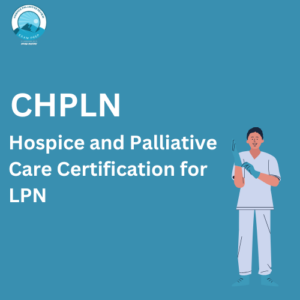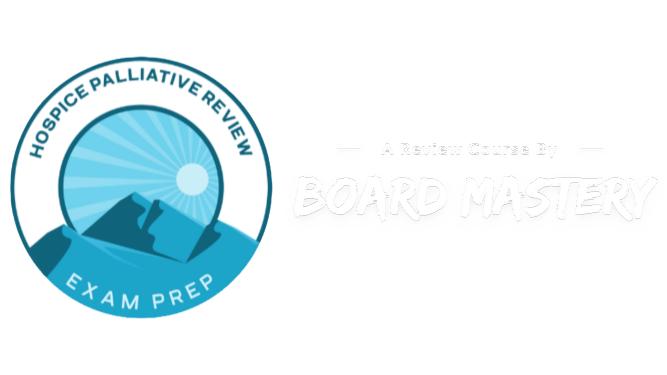
Licensed Practical Nurses (LPNs) play a crucial role in delivering compassionate and skilled care to patients facing serious illnesses or end-of-life stages. Earning hospice certification enhances professional competencies, validates commitment to the field, and boosts the ability to provide exceptional palliative care. The Hospice and Palliative Credentialing Center (HPCC) offers the Certified Hospice and Palliative Licensed Nurse (CHPLN) credential, specifically designed for LPNs delivering specialized care.
The Hospice and Palliative Nurses Association (HPNA) supports LPNs seeking credentialing by providing resources, including review courses, practice exams, and continuing education opportunities. The Hospice and Palliative Nurses Foundation (HPNF) complements this support by offering funding options and scholarships for education and certification.
At HospicePalliativeReview.com, we provide comprehensive review materials designed to help individuals achieve proficiency in hospice and palliative care. Whether you’re preparing for certifications or seeking to enhance your knowledge, our resources are tailored to meet your needs. Explore our offerings and learn more at www.hospicepalliativereview.com.
CHPLN Exam Details
Eligibility Requirements
To qualify for the CHPLN certification exam, candidates must meet the following criteria:
- Hold a current, active LPN or LVN license.
- Have direct hands-on experience in hospice or palliative care, as required by the HPCC: 500 hours of practice in the past 12 months or 1,000 hours in the past 24 months.
Those preparing for certification can access resources through the HPNA, which provides review materials, and the HPNF, which offers funding options to help cover certification costs.
CHPLN Exam Details and Preparation
The CHPLN examination focuses on key areas, including:
- Patient and family care: Understanding the physical, emotional, and spiritual needs of patients and families.
- Symptom management: Addressing issues such as pain, dyspnea, and nausea.
- Ethical and legal considerations: Maintaining compliance with professional standards.
Preparation resources include the HPCC’s exam content outline, practice questions, and study guides. Additionally, the HPNA offers review courses and study groups to enhance exam readiness.
Overview
Difference Between Hospice and Palliative Care
While hospice care primarily focuses on end-of-life care, palliative care can be provided at any stage of a serious illness, even alongside curative treatments. Both aim to improve quality of life, but hospice care is reserved for patients with a prognosis of six months or less if the disease follows its expected course.
Benefits of Obtaining a Specialty Certification
Certification in hospice or palliative care offers several benefits:
- Demonstrates dedication and expertise in the specialty.
- Enhances credibility and job opportunities.
- May lead to salary increases and career advancement.
- Ensures the LPN remains current with best practices in hospice and palliative care.
Comparison of CHPLN, CHPN, ACHPN, and CHPPN Certifications
The CHPLN, CHPN, ACHPN, and CHPPN certifications cater to professionals at different levels of practice and specialties within hospice and palliative care.
The Certified Hospice and Palliative Licensed Nurse (CHPLN) certification is tailored for Licensed Practical Nurses (LPNs) and Licensed Vocational Nurses (LVNs). Candidates must hold a current LPN or LVN license. The CHPLN certification exam focuses on patient and family care, symptom management, and ethical considerations.
The Certified Hospice and Palliative Nurse (CHPN) certification is intended for Registered Nurses (RNs) specializing in hospice and palliative care. To be eligible, candidates must hold a current RN license. The CHPN exam emphasizes advanced clinical care, patient management, and ethical decision-making.
The Advanced Certified Hospice and Palliative Nurse (ACHPN) certification is available for advanced practice nurses, such as Nurse Practitioners (NPs) and Clinical Nurse Specialists (CNSs). Candidates must have an advanced practice license. The ACHPN exam focuses on leadership, advanced symptom management, and team coordination in hospice and palliative care.
The Certified Hospice and Palliative Pediatric Nurse (CHPPN) certification is designed for Registered Nurses working with children. Candidates must hold a current RN license. The CHPPN exam emphasizes pediatric-specific symptom management, family-centered care, and ethical considerations for children with life-limiting illnesses.
Nursing Certification
Importance of Certification in the Nursing Field:
Certification validates an LPN’s knowledge and skills, providing an objective measure of competency that reassures employers, patients, and families. Healthcare facilities increasingly prioritize hiring certified professionals to meet the demands of complex patient needs.
Impact of Certification on Patient Care
Certified LPNs bring enhanced knowledge and skills, leading to:
- Improved symptom management.
- Excellent empathy and holistic care.
- Consistent use of best practices and adherence to regulatory standards.
This directly raises the quality of care in hospice and palliative settings.
Maintaining Certification Through Recertification
Overview of Recertification Process
To maintain the CHPLN certification, LPNs must complete the recertification process, which typically includes:
- Accumulating continuing education hours in hospice and palliative care over a four-year period, or
- Re-taking and passing the certification exam.
Recertification allows LPNs to demonstrate their commitment to lifelong learning and adapt to advancements in the field.
Continuing Education Requirements
Certified LPNs are required to pursue ongoing education in hospice and palliative care topics. This ensures they remain current with best practices, patient management, and ethical considerations.
Benefits of Maintaining Certification
Recertification provides benefits such as:
- Improved job security and competitiveness in the workforce.
- Reassurance for patients and employers of ongoing competency.
- A proactive approach to professional development and patient care.
Conclusion
By earning the CHPLN credential, LPNs distinguish themselves as professionals dedicated to excellence. Certified LPNs not only elevate their professional status but also profoundly impact the lives of patients and families by providing comfort, empathy, and expertise at critical stages of life.
FAQs on Hospice and Palliative Care Nursing Certifications
Q: What is the role of LPNs in hospice?
A: LPNs in hospice provide direct patient care, manage symptoms, ensure comfort, and support patients and families emotionally and physically.
Q: What is ACHPN certification?
A: ACHPN stands for Advanced Certified Hospice and Palliative Nurse, a certification for advanced practice nurses, such as a NP or CNS, specializing in hospice and palliative care.
Q: What is a hospice LVN?
A: A hospice Licensed Vocational Nurse (LVN) provides care similar to an LPN, focusing on palliative and hospice care, symptom management, and enhancing the quality of life.
Q: What is CHPN certification?
A: CHPN (Certified Hospice and Palliative Nurse) certification is available to registered nurses specializing in hospice and palliative care, validating expertise in managing symptoms and providing emotional support.
Q: How do I prepare for the CHPN or ACHPN exam?
A: Comprehensive preparation resources, including practice question banks, review courses, and study materials, are available on www.hospicepalliativereview.com. This includes over 1,300 practice questions for the ACHPN exam and over 1,400 for the CHPN exam, with predictor exams and review content designed to help you succeed.
